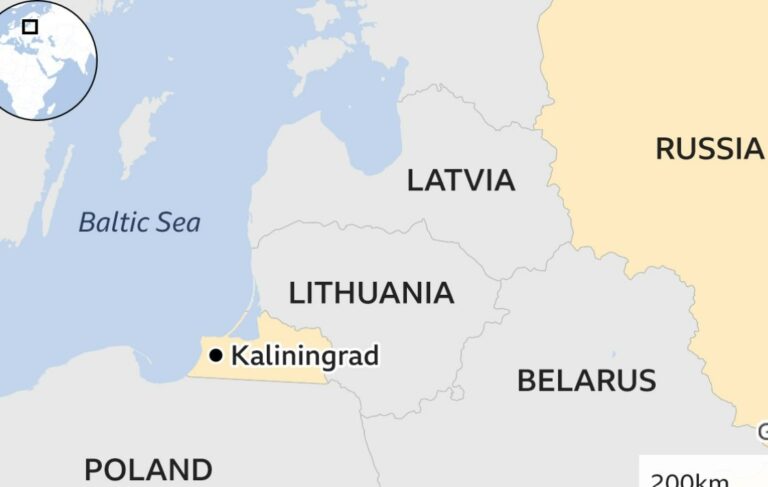The Committee for the Standardisation of Geographical Names outside the Republic of Poland has recommended renaming the exclave Królewiec with immediate effect. Thus triggering the wrath of the Kremlin.
The Kremlin doesn’t go for it. Moreover, at the suggestion by a Polish government agency to use a different name for the Russian exclave of Kaliningrad, on the Baltic, it reacted strongly. Showing, once again, its muscles. According to the Poles, the city and the surrounding area should be called Królewiec.
This, at least, was the traditional name of the area. The change, then, would best reflect the desire to no longer use an ‘imposed name’. And, again, would mark a small, but significant turning point to distance themselves once more from the Russian invasion of Ukraine.
Hard, very hard as said, is Moscow’s response. According to which the discussion on the matter is “bordering on madness” and, worse, “a hostile act”. Thus Kremlin spokesman Dmitry Peskov: “We know that throughout history Poland has slipped from time to time into hatred towards the Russians”.
Table of Contents
Kaliningrad: one city, many names
For hundreds of years before the Second World War, the area was known by the German name, Königsberg. Królewiec, in fact, is simply the Polish translation of the Prussian name.
That said, after World War II, the city and region were placed under Soviet administration. Moscow reflexively chose the name Kaliningrad in honour of Mikhail Kalinin, one of the leaders of the Bolshevik revolution.
Following the collapse of the Soviet Union, the territory of Kaliningrad was integrated into the Russian Federation. It thus became an exclave. Namely, an area geographically separated from the territory of the country, located between Poland and the newly formed Lithuania, the first of the former Soviet republics to declare independence.
A strategically important exclave for the Kremlin, since it hosts the Russian Baltic Fleet in the port of Baltiysk, the only one on European territory for Russia completely free of ice during the winter months.
The Katyn issue
Tensions between Moscow and Warsaw escalated after the Polish Committee for the Standardisation of Geographical Names outside the Republic of Poland recommended with immediate effect to change the name Kaliningrad to Królewiec.
According to the Committee, the name Kaliningrad is not related to either the city or the region. Not only that, it would have an ’emotional and negative’ resonance in Poland. Mikhail Kalinin, in fact, was one of the six members of the Soviet Politburo who signed the order to execute over 21,000 Polish prisoners of war in the Katyn forest in 1940.
When the Germans discovered the mass graves in 1943, Moscow initially blamed the Nazis for the massacre. Because Moscow imposed a strict communist regime on Poland after the Second World War, the relatives of the victims were not allowed to publicly discuss or discover anything about the affair for five decades. Russia finally acknowledged its responsibility for the massacre only in 1990.
The Russian invasion of Ukraine and the Kremlin’s continued propaganda efforts, coming out of the Kaliningrad issue, prompted Poland to re-evaluate controversial ‘imposed names’. The Committee explained:
“Every country has the right to use traditional names that constitute its cultural heritage in its own language, but it cannot be forced to use names that are unacceptable to it in its own language”
Although the Committee’s recommendation is not binding, it is likely that Polish state bodies will now refer to Kaliningrad as Królewiec. The Polish Foreign Ministry, for example, issued a positive assessment of the name change.
Poland fortifies borders
The name change to Kaliningrad, in some ways, is a logical consequence of what Poland has done since the beginning of the war. Warsaw, for one, has also started to fortify its border with the exclave.
The army has erected a temporary barbed wire fence 2.5 metres high. And, is working on installing cameras and motion sensors along the 232-kilometre border with Russia. Anti-tank barriers have also been placed at the crossings.
Polish officials fear that Moscow may use that border as a new route for migrants wishing to reach the European Union. In this sense, it was the increase in flights from the Middle East to Kaliningrad that triggered the alarm. On the migrant front, Poland had erected a five-and-a-half-metre-high steel fence along part of its border with Belarus. This, after noticing an increase in transits.
Read also: Ukraine’s preannounced counteroffensive: what are the goals and when it may start












